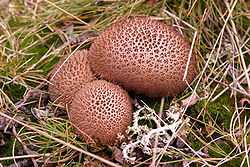Lycoperdon umbrinum
From Wikipedia, the free encyclopedia
| Lycoperdon umbrinum | |
|---|---|
 | |
| Lycoperdon umbrinum, found in Gala (Norway) in late August. | |
| Scientific classification | |
| Kingdom: | Fungi |
| Division: | Basidiomycota |
| Class: | Agaricomycetes |
| Order: | Agaricales |
| Family: | Agaricaceae |
| Genus: | Lycoperdon |
| Species: | L. umbrinum |
| Binomial name | |
| Lycoperdon umbrinum Pers. (1801) | |
| Lycoperdon umbrinum | |
|---|---|
|
| |
| glebal hymenium | |
| no distinct cap | |
| hymenium attachment is irregular or not applicable | |
| lacks a stipe | |
| spore print is olive | |
| ecology is saprotrophic | |
| edibility: edible | |
Lycoperdon umbrinum, commonly known as the umber-brown puffball, is a type of Puffball mushroom in the genus Lycoperdon. It is found in China,[1] Europe,[2] and North America.[3]
Description
This species has a fruiting body that is shaped like a top or a pear, with a short, partly buried stipe. It is 2 to 5 cm (0.8 to 2.0 in) tall and 1 to 4 cm (0.4 to 1.6 in) broad. The fruiting body is initially pale brown then reddish to blackish brown, and the outer wall has slender, persistent spines up to 1 mm long. Spores are roughly spherical, 3.5–5.5 µm in diameter, with fine warts and a pedicel that is 0.5–15 µm long. It is uncommon and found mostly in coniferous woods on sandy soils.[4]
See also
References
- ↑ Zhishu B, Zheng G, Taihui L. (1993). The Macrofungus Flora of China's Guangdong Province (Chinese University Press). New York: Columbia University Press. p. 692. ISBN 962-201-556-5.
- ↑ Jordan M. (2004). The Encyclopedia of Fungi of Britain and Europe. London: Frances Lincoln Publishers. p. 358. ISBN 0-7112-2378-5. Retrieved 2010-01-05.
- ↑ Miller HR, Miller OK. (2006). North American Mushrooms: a Field Guide to Edible and Inedible Fungi. Guilford, Conn.: Falcon Guide. p. 455. ISBN 0-7627-3109-5. Retrieved 2010-01-05.
- ↑ Ellis, J. B.; Ellis, Martin B. (1990). Fungi without Gills (Hymenomycetes and Gasteromycetes): an Identification Handbook. London: Chapman and Hall. p. 239. ISBN 0-412-36970-2.
External links
| Wikimedia Commons has media related to Lycoperdon umbrinum. |
This article is issued from Wikipedia. The text is available under the Creative Commons Attribution/Share Alike; additional terms may apply for the media files.